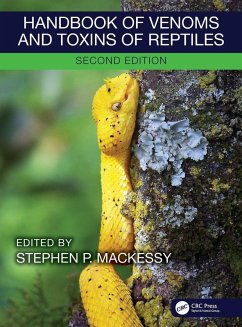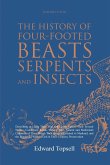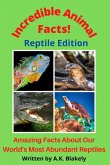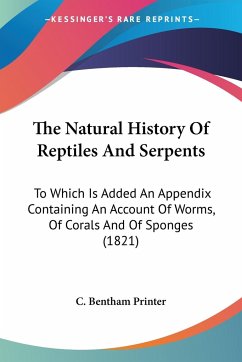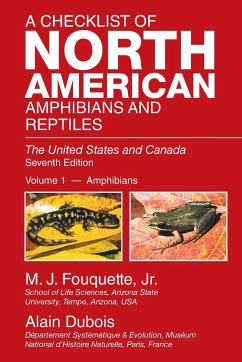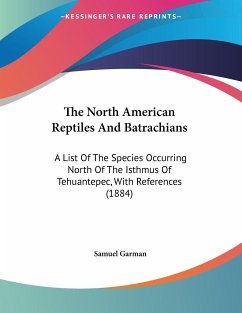Handbook of Venoms and Toxins of Reptiles
Herausgeber: Mackessy, Stephen P.
Handbook of Venoms and Toxins of Reptiles
Herausgeber: Mackessy, Stephen P.
- Gebundenes Buch
- Merkliste
- Auf die Merkliste
- Bewerten Bewerten
- Teilen
- Produkt teilen
- Produkterinnerung
- Produkterinnerung
A decade after publication of the first edition, Handbook of Venoms and Toxins of Reptiles responds to extensive changes in the field of toxinology to endure as the most comprehensive review of reptile venoms on the market. The six sections of this new edition, which has nearly doubled in size, complement the original handbook by presenting current information from many of the leading researchers and physicians in toxinology, with topics ranging from functional morphology, evolution and ecology to crystallography, -omics technologies, drug discovery and more. With the recent recognition by the…mehr
Andere Kunden interessierten sich auch für
![The History of Four-Footed Beasts, Serpents and Insects Vol. II of III The History of Four-Footed Beasts, Serpents and Insects Vol. II of III]() Edward TopsellThe History of Four-Footed Beasts, Serpents and Insects Vol. II of III48,99 €
Edward TopsellThe History of Four-Footed Beasts, Serpents and Insects Vol. II of III48,99 €![Incredible Animal Facts! Reptile Edition Incredible Animal Facts! Reptile Edition]() A. K. BlakelyIncredible Animal Facts! Reptile Edition10,99 €
A. K. BlakelyIncredible Animal Facts! Reptile Edition10,99 €![The Natural History Of Reptiles And Serpents The Natural History Of Reptiles And Serpents]() C. Bentham PrinterThe Natural History Of Reptiles And Serpents28,99 €
C. Bentham PrinterThe Natural History Of Reptiles And Serpents28,99 €![A Checklist of North American Amphibians and Reptiles A Checklist of North American Amphibians and Reptiles]() M. J. Fouquette JrA Checklist of North American Amphibians and Reptiles25,99 €
M. J. Fouquette JrA Checklist of North American Amphibians and Reptiles25,99 €![The North American Reptiles And Batrachians The North American Reptiles And Batrachians]() Samuel GarmanThe North American Reptiles And Batrachians22,99 €
Samuel GarmanThe North American Reptiles And Batrachians22,99 €![The Wild Beasts, Birds and Reptiles of the World The Wild Beasts, Birds and Reptiles of the World]() P. T. BarnumThe Wild Beasts, Birds and Reptiles of the World40,99 €
P. T. BarnumThe Wild Beasts, Birds and Reptiles of the World40,99 €![HowExpert Guide to Bioactive Terrariums for Reptiles HowExpert Guide to Bioactive Terrariums for Reptiles]() HowexpertHowExpert Guide to Bioactive Terrariums for Reptiles35,99 €
HowexpertHowExpert Guide to Bioactive Terrariums for Reptiles35,99 €-
-
-
A decade after publication of the first edition, Handbook of Venoms and Toxins of Reptiles responds to extensive changes in the field of toxinology to endure as the most comprehensive review of reptile venoms on the market. The six sections of this new edition, which has nearly doubled in size, complement the original handbook by presenting current information from many of the leading researchers and physicians in toxinology, with topics ranging from functional morphology, evolution and ecology to crystallography, -omics technologies, drug discovery and more. With the recent recognition by the World Health Organization of snakebite as a neglected tropical disease, the section on snakebite has been expanded and includes several chapters dealing with the problem broadly and with new technologies and the promises these new approaches may hold to counter the deleterious effects of envenomation. This greatly expanded handbook offers a unique resource for biologists, biochemists, toxicologists, physicians, clinicians, and epidemiologists, as well as informed laypersons interested in the biology of venomous reptiles, the biochemistry and molecular biology of venoms, and the effects and treatment of human envenomation.
Hinweis: Dieser Artikel kann nur an eine deutsche Lieferadresse ausgeliefert werden.
Hinweis: Dieser Artikel kann nur an eine deutsche Lieferadresse ausgeliefert werden.
Produktdetails
- Produktdetails
- Verlag: CRC Press
- 2. Auflage
- Seitenzahl: 682
- Erscheinungstermin: 25. Mai 2021
- Englisch
- Abmessung: 286mm x 221mm x 41mm
- Gewicht: 1947g
- ISBN-13: 9780367149741
- ISBN-10: 0367149745
- Artikelnr.: 69936117
- Herstellerkennzeichnung
- Produktsicherheitsverantwortliche/r
- Europaallee 1
- 36244 Bad Hersfeld
- gpsr@libri.de
- Verlag: CRC Press
- 2. Auflage
- Seitenzahl: 682
- Erscheinungstermin: 25. Mai 2021
- Englisch
- Abmessung: 286mm x 221mm x 41mm
- Gewicht: 1947g
- ISBN-13: 9780367149741
- ISBN-10: 0367149745
- Artikelnr.: 69936117
- Herstellerkennzeichnung
- Produktsicherheitsverantwortliche/r
- Europaallee 1
- 36244 Bad Hersfeld
- gpsr@libri.de
Stephen P. Mackessy is Professor of Biology in the School of Biological Sciences at the University of Northern Colorado (UNC). His research broadly encompasses the biology of venomous snakes and the biochemistry of snake venoms, and he has published over one hundred scientific papers, book chapters, and natural history notes.
Preface
About the Editor
Contributors
Section I: Introduction and Technologies Used in Toxinology
1. Reptile venoms and toxins: Unlimited opportunities for basic and applied
research - Stephen P. Mackessy
2. Present and future of snake venom proteomics profiling - Juan J. Calvete
and Bruno Lomonte
3. Applications of genomics and related technologies for studying reptile
venoms - Drew R. Schield, Blair W. Perry, Giulia I.M. Pasquesi, Richard W.
Orton, Zachary L. Nikolakis, Aundrea K. Westfall, Todd A. Castoe
4. Snake venom gland transcriptomics - Cassandra M. Modahl and Rajeev
Kungur Brahma
5. X-ray crystallography and structural studies of toxins - Vinícius
Lucatelle da Silva, Ricardo Barros Mariutti, Mônika Aparecida Coronado,
Raphael Josef Eberle, Fábio Rogério de Moraes and Raghuvir Krishnaswamy
Arni
6. Envenomations and Treatment: Translating between the bench and the
bedside - Nicklaus Brandehoff and Jordan Benjamin
7. Current assessment of the state of snake venom toxinological research
with a view to the future - Sarah Natalie Cirilo Gimenes and Jay W. Fox
Section II: Venom Gland Structure, Systematics and Ecology
8. Reptile venom glands: Form, function, future, concepts and controversies
- Scott A. Weinstein
9. Advances in venomous snake systematics, 2009-2019 - Wolfgang Wüster
10. Biochemical ecology of venomous snakes - Cara F. Smith and Stephen P.
Mackessy
11. Resistance of native species to reptile venoms -- Danielle H. Drabeck
Section III: Reptile Venom Non-enzymatic Toxins
12. Three-finger toxins - Rajeev Kungur Brahma, Cassandra M. Modahl and
R. Manjunatha Kini
13. Myotoxin a, crotamine and defensin homologs in reptile venoms - Lucas
C. Porta, Pedro Z. Amaral, Paulo Z. Amaral and Mirian A. F. Hayashi
14. Reptile venom disintegrins - Anthony J. Saviola and Juan J. Calvete
15. Reptile venom cysteine-rich secretory proteins - María Elisa Peichoto
and Marcelo Larami Santoro
16. Bradykinin-potentiating and related peptides from reptile venoms -
Daniel Carvalho Pimenta and Patrick Jack Spencer
17. Exendins and its related proteins - Michelle Khai Khun Yap and
Nurhamimah Misuan
18. Reptile venom C-type-lectins - Kenneth J. Clemetson
19. Snake venom Kunitz-type inhibitors and cystatins - structure and
function - Elda E. Sánchez, Emelyn Salazar, Montamas Suntravat and
Francisco Torres
20. Small molecular constituents of snake venoms - Alejandro Villar-Briones
and Steven D. Aird
21. Cobra venom factor: Structure, function, biology, research tool and
drug lead - Carl-Wilhelm Vogel, Brian E. Hew and David C. Fritzinger
22. Snake toxins targeting diverse ion channels - Matan Geron and Avi Priel
Section IV: Reptile Venom Enzyme Toxins
23. Thrombin-like serine proteinases in reptile venoms - Stephen D.
Swenson, Samantha Stack
and Francis S. Markland Jr.
24. Snake venom metalloproteinases - Charlotte A. Dawson, Stuart Ainsworth,
Laura-Oana Albulescu and Nicholas R. Casewell
25. Snake venom matrix metalloproteinases (svMMPs): Alternative proteolytic
enzymes in rear-fanged snake venoms - Inácio L. M. Junqueira-de-Azevedo and
Juan David Bayona-Serrano
26. Snake venom phospholipase A2 toxins - Bruno Lomonte and Igor Kriaj
27. Reptile venom L-amino acid oxidases - structure and function - Juliana
P. Zuliania, Mauro V. Paloschi, Adriana S. Pontes, Charles N. Boeno,
Jéssica A. Lopes, Sulamita S. Setubal, Fernando B. Zanchi and Andreimar M.
Soares
28. Snake venom nucleases, nucleotidases, and phosphomonoesterases - Jüri
Siigur and Ene Siigur
29. Reptile venom acetylcholinesterases - Mushtaq Ahmed, Wasim Ahmad, Nadia
Mushtaq,
Rehmat Ali Khan and Maria Rosa Chitolina Schetinger
30. Inhibitors of reptile venom toxins - Ana F. Gómez Garay, Jorge J.
Alfonso, Anderson M. Kayano, Juliana C. Sobrinho, Cleopatra A. S. Caldeira,
Rafaela Diniz-Sousa, Fernando B. Zanchi, Juliana P. Zuliani, and Andreimar
M. Soares
Section V: Global Approaches to Envenomations and Treatments
31. Snakebite envenomation as a neglected tropical disease: new impetus for
confronting an old scourge - José María Gutiérrez
32. Current industrial production of snake antivenoms - Mariángela Vargas,
Melvin Sánchez, Andrés Hernández, Aarón Gómez, Mauricio Arguedas, Andrés
Sánchez, Laura Sánchez, Mauren Villalta, María Herrera and Álvaro Segura
33. Antivenom in the age of recombinant DNA technology - Andreas H.
Laustsen
34. Epidemiology and treatment of reptile envenomations in the United
States - Daniel E. Keyler and Nicklaus Brandehoff
35. Envenomations by reptiles in México - Edgar Neri-Castro, Melisa
Bénard-Valle, Jorge López de León, Leslie Boyer and Alejandro Alagón
36. Snakebite envenomation in Central America: Epidemiology,
pathophysiology and treatment - José María Gutiérrez
37. Snakebite in Southeast Asia: Envenomation and clinical management- Nget
Hong Tan, Kae Yi Tan and Choo Hock Tan
38. Snake envenomation: Therapy and challenges in India - Ashis K.
Mukherjee, Bhargab Kalita, Sumita Dutta, Aparup Patra, Chitta R. Maiti and
Dileep Punde
39. Snakebite in Africa: Current situation and urgent needs - Jean-Philippe
Chippaux
40. Approaches to snake envenomation in Southern Africa - James Pattinson,
George Oosthuizen, Colin R. Tilbury and Darryl Wood
Section VI: Reptile Venoms - Production and as a Source of Therapeutics
41. Large-scale snake colonies for venom production: Considerations and
challenges - Kristen L. Wiley and James R. Harrison
42. Toxins to drugs - biochemistry and pharmacology - Zoltan Takacs
About the Editor
Contributors
Section I: Introduction and Technologies Used in Toxinology
1. Reptile venoms and toxins: Unlimited opportunities for basic and applied
research - Stephen P. Mackessy
2. Present and future of snake venom proteomics profiling - Juan J. Calvete
and Bruno Lomonte
3. Applications of genomics and related technologies for studying reptile
venoms - Drew R. Schield, Blair W. Perry, Giulia I.M. Pasquesi, Richard W.
Orton, Zachary L. Nikolakis, Aundrea K. Westfall, Todd A. Castoe
4. Snake venom gland transcriptomics - Cassandra M. Modahl and Rajeev
Kungur Brahma
5. X-ray crystallography and structural studies of toxins - Vinícius
Lucatelle da Silva, Ricardo Barros Mariutti, Mônika Aparecida Coronado,
Raphael Josef Eberle, Fábio Rogério de Moraes and Raghuvir Krishnaswamy
Arni
6. Envenomations and Treatment: Translating between the bench and the
bedside - Nicklaus Brandehoff and Jordan Benjamin
7. Current assessment of the state of snake venom toxinological research
with a view to the future - Sarah Natalie Cirilo Gimenes and Jay W. Fox
Section II: Venom Gland Structure, Systematics and Ecology
8. Reptile venom glands: Form, function, future, concepts and controversies
- Scott A. Weinstein
9. Advances in venomous snake systematics, 2009-2019 - Wolfgang Wüster
10. Biochemical ecology of venomous snakes - Cara F. Smith and Stephen P.
Mackessy
11. Resistance of native species to reptile venoms -- Danielle H. Drabeck
Section III: Reptile Venom Non-enzymatic Toxins
12. Three-finger toxins - Rajeev Kungur Brahma, Cassandra M. Modahl and
R. Manjunatha Kini
13. Myotoxin a, crotamine and defensin homologs in reptile venoms - Lucas
C. Porta, Pedro Z. Amaral, Paulo Z. Amaral and Mirian A. F. Hayashi
14. Reptile venom disintegrins - Anthony J. Saviola and Juan J. Calvete
15. Reptile venom cysteine-rich secretory proteins - María Elisa Peichoto
and Marcelo Larami Santoro
16. Bradykinin-potentiating and related peptides from reptile venoms -
Daniel Carvalho Pimenta and Patrick Jack Spencer
17. Exendins and its related proteins - Michelle Khai Khun Yap and
Nurhamimah Misuan
18. Reptile venom C-type-lectins - Kenneth J. Clemetson
19. Snake venom Kunitz-type inhibitors and cystatins - structure and
function - Elda E. Sánchez, Emelyn Salazar, Montamas Suntravat and
Francisco Torres
20. Small molecular constituents of snake venoms - Alejandro Villar-Briones
and Steven D. Aird
21. Cobra venom factor: Structure, function, biology, research tool and
drug lead - Carl-Wilhelm Vogel, Brian E. Hew and David C. Fritzinger
22. Snake toxins targeting diverse ion channels - Matan Geron and Avi Priel
Section IV: Reptile Venom Enzyme Toxins
23. Thrombin-like serine proteinases in reptile venoms - Stephen D.
Swenson, Samantha Stack
and Francis S. Markland Jr.
24. Snake venom metalloproteinases - Charlotte A. Dawson, Stuart Ainsworth,
Laura-Oana Albulescu and Nicholas R. Casewell
25. Snake venom matrix metalloproteinases (svMMPs): Alternative proteolytic
enzymes in rear-fanged snake venoms - Inácio L. M. Junqueira-de-Azevedo and
Juan David Bayona-Serrano
26. Snake venom phospholipase A2 toxins - Bruno Lomonte and Igor Kriaj
27. Reptile venom L-amino acid oxidases - structure and function - Juliana
P. Zuliania, Mauro V. Paloschi, Adriana S. Pontes, Charles N. Boeno,
Jéssica A. Lopes, Sulamita S. Setubal, Fernando B. Zanchi and Andreimar M.
Soares
28. Snake venom nucleases, nucleotidases, and phosphomonoesterases - Jüri
Siigur and Ene Siigur
29. Reptile venom acetylcholinesterases - Mushtaq Ahmed, Wasim Ahmad, Nadia
Mushtaq,
Rehmat Ali Khan and Maria Rosa Chitolina Schetinger
30. Inhibitors of reptile venom toxins - Ana F. Gómez Garay, Jorge J.
Alfonso, Anderson M. Kayano, Juliana C. Sobrinho, Cleopatra A. S. Caldeira,
Rafaela Diniz-Sousa, Fernando B. Zanchi, Juliana P. Zuliani, and Andreimar
M. Soares
Section V: Global Approaches to Envenomations and Treatments
31. Snakebite envenomation as a neglected tropical disease: new impetus for
confronting an old scourge - José María Gutiérrez
32. Current industrial production of snake antivenoms - Mariángela Vargas,
Melvin Sánchez, Andrés Hernández, Aarón Gómez, Mauricio Arguedas, Andrés
Sánchez, Laura Sánchez, Mauren Villalta, María Herrera and Álvaro Segura
33. Antivenom in the age of recombinant DNA technology - Andreas H.
Laustsen
34. Epidemiology and treatment of reptile envenomations in the United
States - Daniel E. Keyler and Nicklaus Brandehoff
35. Envenomations by reptiles in México - Edgar Neri-Castro, Melisa
Bénard-Valle, Jorge López de León, Leslie Boyer and Alejandro Alagón
36. Snakebite envenomation in Central America: Epidemiology,
pathophysiology and treatment - José María Gutiérrez
37. Snakebite in Southeast Asia: Envenomation and clinical management- Nget
Hong Tan, Kae Yi Tan and Choo Hock Tan
38. Snake envenomation: Therapy and challenges in India - Ashis K.
Mukherjee, Bhargab Kalita, Sumita Dutta, Aparup Patra, Chitta R. Maiti and
Dileep Punde
39. Snakebite in Africa: Current situation and urgent needs - Jean-Philippe
Chippaux
40. Approaches to snake envenomation in Southern Africa - James Pattinson,
George Oosthuizen, Colin R. Tilbury and Darryl Wood
Section VI: Reptile Venoms - Production and as a Source of Therapeutics
41. Large-scale snake colonies for venom production: Considerations and
challenges - Kristen L. Wiley and James R. Harrison
42. Toxins to drugs - biochemistry and pharmacology - Zoltan Takacs
Preface
About the Editor
Contributors
Section I: Introduction and Technologies Used in Toxinology
1. Reptile venoms and toxins: Unlimited opportunities for basic and applied
research - Stephen P. Mackessy
2. Present and future of snake venom proteomics profiling - Juan J. Calvete
and Bruno Lomonte
3. Applications of genomics and related technologies for studying reptile
venoms - Drew R. Schield, Blair W. Perry, Giulia I.M. Pasquesi, Richard W.
Orton, Zachary L. Nikolakis, Aundrea K. Westfall, Todd A. Castoe
4. Snake venom gland transcriptomics - Cassandra M. Modahl and Rajeev
Kungur Brahma
5. X-ray crystallography and structural studies of toxins - Vinícius
Lucatelle da Silva, Ricardo Barros Mariutti, Mônika Aparecida Coronado,
Raphael Josef Eberle, Fábio Rogério de Moraes and Raghuvir Krishnaswamy
Arni
6. Envenomations and Treatment: Translating between the bench and the
bedside - Nicklaus Brandehoff and Jordan Benjamin
7. Current assessment of the state of snake venom toxinological research
with a view to the future - Sarah Natalie Cirilo Gimenes and Jay W. Fox
Section II: Venom Gland Structure, Systematics and Ecology
8. Reptile venom glands: Form, function, future, concepts and controversies
- Scott A. Weinstein
9. Advances in venomous snake systematics, 2009-2019 - Wolfgang Wüster
10. Biochemical ecology of venomous snakes - Cara F. Smith and Stephen P.
Mackessy
11. Resistance of native species to reptile venoms -- Danielle H. Drabeck
Section III: Reptile Venom Non-enzymatic Toxins
12. Three-finger toxins - Rajeev Kungur Brahma, Cassandra M. Modahl and
R. Manjunatha Kini
13. Myotoxin a, crotamine and defensin homologs in reptile venoms - Lucas
C. Porta, Pedro Z. Amaral, Paulo Z. Amaral and Mirian A. F. Hayashi
14. Reptile venom disintegrins - Anthony J. Saviola and Juan J. Calvete
15. Reptile venom cysteine-rich secretory proteins - María Elisa Peichoto
and Marcelo Larami Santoro
16. Bradykinin-potentiating and related peptides from reptile venoms -
Daniel Carvalho Pimenta and Patrick Jack Spencer
17. Exendins and its related proteins - Michelle Khai Khun Yap and
Nurhamimah Misuan
18. Reptile venom C-type-lectins - Kenneth J. Clemetson
19. Snake venom Kunitz-type inhibitors and cystatins - structure and
function - Elda E. Sánchez, Emelyn Salazar, Montamas Suntravat and
Francisco Torres
20. Small molecular constituents of snake venoms - Alejandro Villar-Briones
and Steven D. Aird
21. Cobra venom factor: Structure, function, biology, research tool and
drug lead - Carl-Wilhelm Vogel, Brian E. Hew and David C. Fritzinger
22. Snake toxins targeting diverse ion channels - Matan Geron and Avi Priel
Section IV: Reptile Venom Enzyme Toxins
23. Thrombin-like serine proteinases in reptile venoms - Stephen D.
Swenson, Samantha Stack
and Francis S. Markland Jr.
24. Snake venom metalloproteinases - Charlotte A. Dawson, Stuart Ainsworth,
Laura-Oana Albulescu and Nicholas R. Casewell
25. Snake venom matrix metalloproteinases (svMMPs): Alternative proteolytic
enzymes in rear-fanged snake venoms - Inácio L. M. Junqueira-de-Azevedo and
Juan David Bayona-Serrano
26. Snake venom phospholipase A2 toxins - Bruno Lomonte and Igor Kriaj
27. Reptile venom L-amino acid oxidases - structure and function - Juliana
P. Zuliania, Mauro V. Paloschi, Adriana S. Pontes, Charles N. Boeno,
Jéssica A. Lopes, Sulamita S. Setubal, Fernando B. Zanchi and Andreimar M.
Soares
28. Snake venom nucleases, nucleotidases, and phosphomonoesterases - Jüri
Siigur and Ene Siigur
29. Reptile venom acetylcholinesterases - Mushtaq Ahmed, Wasim Ahmad, Nadia
Mushtaq,
Rehmat Ali Khan and Maria Rosa Chitolina Schetinger
30. Inhibitors of reptile venom toxins - Ana F. Gómez Garay, Jorge J.
Alfonso, Anderson M. Kayano, Juliana C. Sobrinho, Cleopatra A. S. Caldeira,
Rafaela Diniz-Sousa, Fernando B. Zanchi, Juliana P. Zuliani, and Andreimar
M. Soares
Section V: Global Approaches to Envenomations and Treatments
31. Snakebite envenomation as a neglected tropical disease: new impetus for
confronting an old scourge - José María Gutiérrez
32. Current industrial production of snake antivenoms - Mariángela Vargas,
Melvin Sánchez, Andrés Hernández, Aarón Gómez, Mauricio Arguedas, Andrés
Sánchez, Laura Sánchez, Mauren Villalta, María Herrera and Álvaro Segura
33. Antivenom in the age of recombinant DNA technology - Andreas H.
Laustsen
34. Epidemiology and treatment of reptile envenomations in the United
States - Daniel E. Keyler and Nicklaus Brandehoff
35. Envenomations by reptiles in México - Edgar Neri-Castro, Melisa
Bénard-Valle, Jorge López de León, Leslie Boyer and Alejandro Alagón
36. Snakebite envenomation in Central America: Epidemiology,
pathophysiology and treatment - José María Gutiérrez
37. Snakebite in Southeast Asia: Envenomation and clinical management- Nget
Hong Tan, Kae Yi Tan and Choo Hock Tan
38. Snake envenomation: Therapy and challenges in India - Ashis K.
Mukherjee, Bhargab Kalita, Sumita Dutta, Aparup Patra, Chitta R. Maiti and
Dileep Punde
39. Snakebite in Africa: Current situation and urgent needs - Jean-Philippe
Chippaux
40. Approaches to snake envenomation in Southern Africa - James Pattinson,
George Oosthuizen, Colin R. Tilbury and Darryl Wood
Section VI: Reptile Venoms - Production and as a Source of Therapeutics
41. Large-scale snake colonies for venom production: Considerations and
challenges - Kristen L. Wiley and James R. Harrison
42. Toxins to drugs - biochemistry and pharmacology - Zoltan Takacs
About the Editor
Contributors
Section I: Introduction and Technologies Used in Toxinology
1. Reptile venoms and toxins: Unlimited opportunities for basic and applied
research - Stephen P. Mackessy
2. Present and future of snake venom proteomics profiling - Juan J. Calvete
and Bruno Lomonte
3. Applications of genomics and related technologies for studying reptile
venoms - Drew R. Schield, Blair W. Perry, Giulia I.M. Pasquesi, Richard W.
Orton, Zachary L. Nikolakis, Aundrea K. Westfall, Todd A. Castoe
4. Snake venom gland transcriptomics - Cassandra M. Modahl and Rajeev
Kungur Brahma
5. X-ray crystallography and structural studies of toxins - Vinícius
Lucatelle da Silva, Ricardo Barros Mariutti, Mônika Aparecida Coronado,
Raphael Josef Eberle, Fábio Rogério de Moraes and Raghuvir Krishnaswamy
Arni
6. Envenomations and Treatment: Translating between the bench and the
bedside - Nicklaus Brandehoff and Jordan Benjamin
7. Current assessment of the state of snake venom toxinological research
with a view to the future - Sarah Natalie Cirilo Gimenes and Jay W. Fox
Section II: Venom Gland Structure, Systematics and Ecology
8. Reptile venom glands: Form, function, future, concepts and controversies
- Scott A. Weinstein
9. Advances in venomous snake systematics, 2009-2019 - Wolfgang Wüster
10. Biochemical ecology of venomous snakes - Cara F. Smith and Stephen P.
Mackessy
11. Resistance of native species to reptile venoms -- Danielle H. Drabeck
Section III: Reptile Venom Non-enzymatic Toxins
12. Three-finger toxins - Rajeev Kungur Brahma, Cassandra M. Modahl and
R. Manjunatha Kini
13. Myotoxin a, crotamine and defensin homologs in reptile venoms - Lucas
C. Porta, Pedro Z. Amaral, Paulo Z. Amaral and Mirian A. F. Hayashi
14. Reptile venom disintegrins - Anthony J. Saviola and Juan J. Calvete
15. Reptile venom cysteine-rich secretory proteins - María Elisa Peichoto
and Marcelo Larami Santoro
16. Bradykinin-potentiating and related peptides from reptile venoms -
Daniel Carvalho Pimenta and Patrick Jack Spencer
17. Exendins and its related proteins - Michelle Khai Khun Yap and
Nurhamimah Misuan
18. Reptile venom C-type-lectins - Kenneth J. Clemetson
19. Snake venom Kunitz-type inhibitors and cystatins - structure and
function - Elda E. Sánchez, Emelyn Salazar, Montamas Suntravat and
Francisco Torres
20. Small molecular constituents of snake venoms - Alejandro Villar-Briones
and Steven D. Aird
21. Cobra venom factor: Structure, function, biology, research tool and
drug lead - Carl-Wilhelm Vogel, Brian E. Hew and David C. Fritzinger
22. Snake toxins targeting diverse ion channels - Matan Geron and Avi Priel
Section IV: Reptile Venom Enzyme Toxins
23. Thrombin-like serine proteinases in reptile venoms - Stephen D.
Swenson, Samantha Stack
and Francis S. Markland Jr.
24. Snake venom metalloproteinases - Charlotte A. Dawson, Stuart Ainsworth,
Laura-Oana Albulescu and Nicholas R. Casewell
25. Snake venom matrix metalloproteinases (svMMPs): Alternative proteolytic
enzymes in rear-fanged snake venoms - Inácio L. M. Junqueira-de-Azevedo and
Juan David Bayona-Serrano
26. Snake venom phospholipase A2 toxins - Bruno Lomonte and Igor Kriaj
27. Reptile venom L-amino acid oxidases - structure and function - Juliana
P. Zuliania, Mauro V. Paloschi, Adriana S. Pontes, Charles N. Boeno,
Jéssica A. Lopes, Sulamita S. Setubal, Fernando B. Zanchi and Andreimar M.
Soares
28. Snake venom nucleases, nucleotidases, and phosphomonoesterases - Jüri
Siigur and Ene Siigur
29. Reptile venom acetylcholinesterases - Mushtaq Ahmed, Wasim Ahmad, Nadia
Mushtaq,
Rehmat Ali Khan and Maria Rosa Chitolina Schetinger
30. Inhibitors of reptile venom toxins - Ana F. Gómez Garay, Jorge J.
Alfonso, Anderson M. Kayano, Juliana C. Sobrinho, Cleopatra A. S. Caldeira,
Rafaela Diniz-Sousa, Fernando B. Zanchi, Juliana P. Zuliani, and Andreimar
M. Soares
Section V: Global Approaches to Envenomations and Treatments
31. Snakebite envenomation as a neglected tropical disease: new impetus for
confronting an old scourge - José María Gutiérrez
32. Current industrial production of snake antivenoms - Mariángela Vargas,
Melvin Sánchez, Andrés Hernández, Aarón Gómez, Mauricio Arguedas, Andrés
Sánchez, Laura Sánchez, Mauren Villalta, María Herrera and Álvaro Segura
33. Antivenom in the age of recombinant DNA technology - Andreas H.
Laustsen
34. Epidemiology and treatment of reptile envenomations in the United
States - Daniel E. Keyler and Nicklaus Brandehoff
35. Envenomations by reptiles in México - Edgar Neri-Castro, Melisa
Bénard-Valle, Jorge López de León, Leslie Boyer and Alejandro Alagón
36. Snakebite envenomation in Central America: Epidemiology,
pathophysiology and treatment - José María Gutiérrez
37. Snakebite in Southeast Asia: Envenomation and clinical management- Nget
Hong Tan, Kae Yi Tan and Choo Hock Tan
38. Snake envenomation: Therapy and challenges in India - Ashis K.
Mukherjee, Bhargab Kalita, Sumita Dutta, Aparup Patra, Chitta R. Maiti and
Dileep Punde
39. Snakebite in Africa: Current situation and urgent needs - Jean-Philippe
Chippaux
40. Approaches to snake envenomation in Southern Africa - James Pattinson,
George Oosthuizen, Colin R. Tilbury and Darryl Wood
Section VI: Reptile Venoms - Production and as a Source of Therapeutics
41. Large-scale snake colonies for venom production: Considerations and
challenges - Kristen L. Wiley and James R. Harrison
42. Toxins to drugs - biochemistry and pharmacology - Zoltan Takacs

